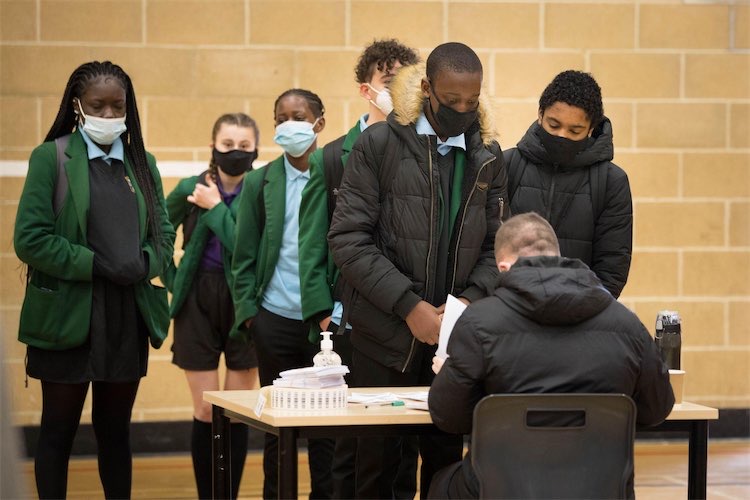Teachers Warn "Week On-Week Off" Schools Plan Must Be Implemented If Covid Cases Rise
4 min read
The country’s largest teaching union is calling for schools to be given the power to implement face-to-face and online learning on alternate weeks if coronavirus cases start to rise.
A rota system was proposed by the government’s own Scientific Advisory Group for Emergencies (Sage) last September as a way of stemming case numbers and the National Education Union (NEU) said Whitehall officials should give schools the power to deploy the strategy.
Sage’s “non-pharmaceutical interventions” NPI paper dated 21 September for potential solutions said a week in and week out of school for pupils could reduce the R-rate by 0.1-0.2.
Scientists classed this measure as having a ‘moderate to low’ impact on transmission of the virus. The closure of pubs, gyms and non-essential retail was also given the same grading.
This paper was produced before the details of a new and more contagious strain of Covid-19 – the Kent variant – first identified on September 20 2020, were released to the public
“Sage told the government in September that a phased operation [for schools] could have the same impact on the R-rate as the closing of hospitality," Kevin Courtney, joint general secretary of the NEU told PoliticsHome.
“If cases were going up in schools in a particular area then the idea is, headteachers could say, 'we’re going to try and stop cases going up by having half the children at home', because then they don’t transmit to anybody else.
"That stops transmission and it gives you more space in the school, and for example only half the kids are travelling on the school bus, so there’s more chance for distancing everywhere else.”

Schools returned today (March 8) for primary and some secondary pupils, though some older age groups are expected to start next week when lateral flow testing is properly underway.
“This is nothing to do with teachers not wanting to work – they would be teaching every lesson – half physically, half remotely, and they’d be in school the whole time,” said Courtney.
But,Courtney added, if Sage's half-in half-out system was believed to reduce the R rate, "we think that’s something that should be seriously looked at”.
The NPI paper found that the measure of closing pubs, cafes and bars, taken on its own, would potentially reduce the R-rate by 0.1-0.2.
Closing gyms reduces the R by 0.1 percent, as did shutting down places of worship. Closing non-essential retail was classed as having a “low impact” on the spread of the transmission. A national lockdown, with all of those measures and restrictions on travel combined, could reduce R from 2.7 to 0.6.
The paper says alternating week-on, week-off school closure with half class sizes “would reduce occupancy density enabling better social distancing and partially mitigating ventilation issues.”
The document did however note that such a system could be disruptive for children and parents.
Other measures listed, like just sending year groups home when cases are found, were not thought to be as effective as a week-on, week-off rota.

Courtney said: “In a secondary school you could possibly run a rota system for Year 9 and above where the kids are that bit older where they taught one week and remotely taught the next week.
"Year 10 could be at home when they're in school, then they swap over.
“We know quite a lot more about online teaching than we did previously. It’s been happening since since January until now and it’s been quite effective.”
Dr Jenny Harries, deputy chief medical officer for England, said in the daily Downing Street press conference that it was likely that the mass testing of children as they start back at school would catch cases and likely see children sent home.
She said: "There may be a very short period at the start of this programme, where everybody gets used to it, where a larger number of children come out of school [to isolate] and then it will settle down. It's important when observing [this], people think this through the next three to four weeks, not the not the first one to two."
